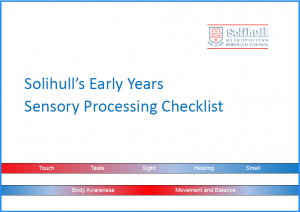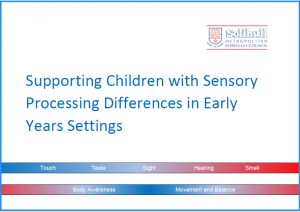Areas of Need – strategies to support children
We have gathered together information and strategies to help you to support children with SEND in your setting. These have been organised below, within the four broad areas of need.
Language:
- Developing children's speech and language
- Pre-verbal activities
- Strategies to support children with language difficulties
- Top tips to support language development
- Activities to develop 2-word-level-understanding-with-nouns
- Oral-Exercises-to-support-speech-development
Communication:
- Makaton
- Makaton - Finger Spelling
- New Makaton List 1 2 x 3 Portrait - Flashcards PDF
- New Makaton List 2 2 x 3 Portrait - Flashcards PDF
- New Makaton List 3 2 x 3 Portrait - Flashcards PDF
- New Makaton List 4 2 x 3 Portrait - Flashcards PDF
- New Makaton List 5 2 x 3 Portrait - Flashcards PDF
- New Makaton List 6 2 x 3 Portrait - Flashcards PDF
- New Makaton List 7 2 x 3 Portrait - Flashcards PDF
- Makaton Charity Website - Sign of the week
- Choice Boards Solihull Early Years Team
- First_Then or Now & Next boards
- First Then_NowNext
- Friendly sabotage to encourage communication
- social-stories-in-early-years
- Reluctant-communicators-1
Interaction:
Supporting the Cognition and Learning of children with SEND
Learning & Play:
- Ideas-to-improve-attention-and listening
- Play Partnering
- Promoting-children's-development
- Routines of play
- Indentiplay
Understanding & following routines:
Physical needs:
Gross & fine motor co-ordination:
Developing self help skills:
- Backward_chaining_advice
- Backward-chaining-information-sheet
- Developing_cutlery_skills
- BSPD Parents and Carers of SEN Supervised Toothbrushing Leaflet
Sensory impairment:
-
- EY Top Tips Hearing Impairment

- Solihull's Early Years Sensory Processing Checklist - Electronic

- Supporting Children with Sensory Processing Differences in Early Years Settings - Electronic
- Early Years Sensory Diet Plan - Template
- Early Years Sensory Diet Plan - Example
- Environmental Sensory Audit
- Environmental Sensory Audit
- A-Guide-to-sensory-circuits
- Strategies for Children Who Mouth, Bite or Chew Non-Food Items
- Heavy work activities
- Advice - head banging
Supporting children's emotional development:
- The Centre for Early Childhood Explainer series - A series of animated films explaining key concepts behind the way nurturing interactions support the social and emotional development of babies and young children.
Difficulty managing emotions:
- Behaviour pack
- Children who refuse to do as you ask and avoid demands
- EYT Relationship-Based-Play-2024
- ACEs-handout
- ACEs-Trauma-and-ASD-Comparison
- Scripts to support positive behaviour
- Emotion-coaching-principles-and-four-steps
- Emotion-coaching
- ABC-Chart-with-guidance
Managing specific issues:
- Supporting young children who bite e-guide (Guidance resource from THRIVE)
- Supporting young children who hit and hurt others e-guide (Guidance resource from THRIVE)
- Early Years SEMH top tips. A link to North Somerset EPS training library - playlist of videos.
Strategies to support positive behaviour:
In addition, we have provided Information and strategies to help practitioners support children with specific needs.
- Comparison between ASD and ACEs Trauma
- Autism in Solihull Information for nursery settings

- Solihull's Early Years Sensory Processing Checklist - ELECTRONIC

- Supporting Children with Sensory Processing Differences in Early Years Settings - ELECTRONIC
- Early Years Sensory Diet Plan - Template
- Early Years Sensory Diet Plan - Example
- Sensory Diet - ideas for activities 2025
- SASS-Strategies-for-supporting-children-on-the-Autism-Spectrum-in-the-Early-Years
- ASD Observation-Form Key areas of difference pre-diagnosis
- A Guide to sensory circuits
- Sensory issues and ASD (iceburg model)
- Supporting children with sensory needs early years
- Making_sense_of_sensory_behaviour
- Pre-term birth - Information for educational professionals - A series of learning resources to improve your knowledge and confidence in supporting prematurely born children in the classroom and in preschool settings.